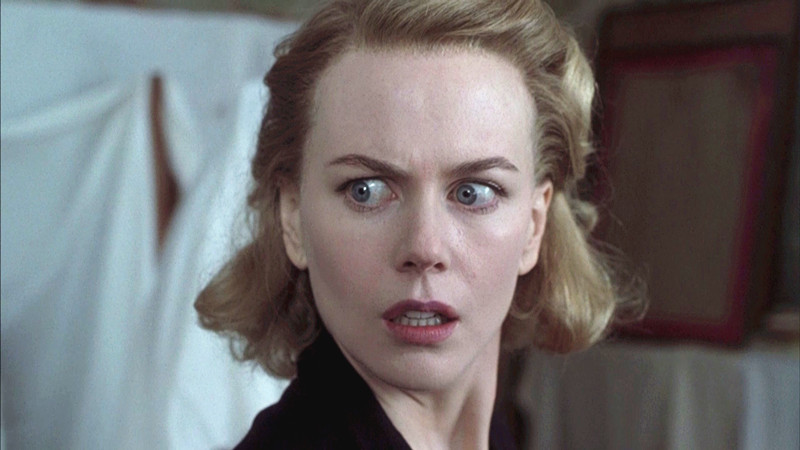
Plot twists are lots of fun, because movies are nothing if not predictable. If you see a giant vat of boiling wax big enough to fit a person, somebody is going to fall in. If the guy and girl hate each other at the beginning, they’re sure to fall in love. If a character says something bad about his boss, she’ll be standing behind him.
Clever movie-makers can use this against us, and build expectations with the usual tricks, and then completely shock and surprise when the twist comes.
A twist can come in any genre of movie, so no matter your taste, sometimes you can be surprised. The following list includes movies from several genres, including some that don’t fit into any genre. These have twists that are either iconic, or just plain stunning. Due to the very nature of plot twists, we can’t talk about them without giving them away. If you don’t want to know the twists, STOP READING HERE! Consider this your final ***SPOILER WARNING***
10. Twelve Monkeys
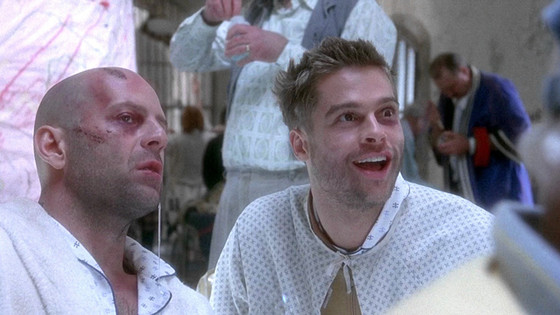
Time travel always has its paradoxes, it comes with the territory. There are many schools of thought as to how it works, and whether it’s possible to change the past at all. Twelve Monkeys belongs to the school of ‘the past cannot be changed,’ which it itself a paradox, as going into the past automatically changes something, and this movie is no exception.
Bruce Willis plays a convict named James Cole who is being sent back in time to find samples to cure a plague that killed most of the people in the world. He is not very clever, and lands in an insane asylum, where he gets to know psychiatrist Kathryn Rally, played by Madeleine Stowe, before vanishing impossibly from a secure room. In reality he’s been whisked back to the present, where he gives his report and manages to persuade his superiors to send him back again.
James has recurring dreams where he sees a man and a woman at an airport, and the man get shot and dies. He thinks the dream-woman is Kathryn, and when he returns to the past he tries to believe that his belief in the future is simple insanity.
However the future won’t let him go. They send others after him, and tell him he’s going to kill the man who will poison the future, and provide him a weapon to do it with.
Then comes the twist: his dream of seeing somebody killed in the airport is his younger self watching his older self being killed before he can find the bad guy.
Why is this plot twist crazy?
Hey, this whole movie is about insanity. It gets there by default.
9. No Way Out
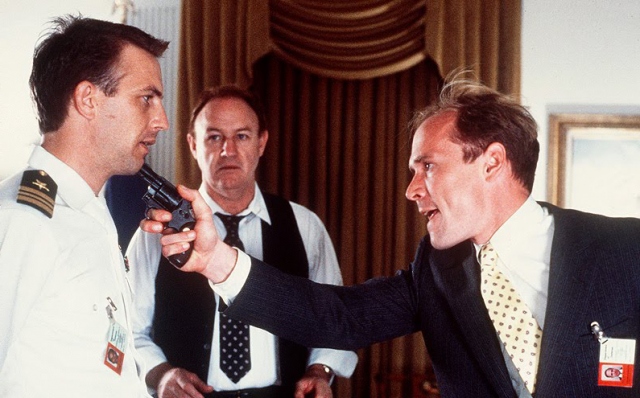
This movie was made back when Kevin Costner enjoyed making movies, and it shows, despite the serious material. Costner plays Tom Farrell, a young officer in the US Navy, who saves a man’s life aboard ship and is brought into the Pentagon to work in the office of the Secretary of Defense, David Brice, played by Gene Hackman.
While working for the Secretary Farrell begins an affair with Susan Atwell, played by Sean Young, who happens to be the kept woman of the Secretary. After Farrell takes her on a weekend aboard a rented sailboat, the Secretary becomes enraged at her infidelity and murders her.
To cover up the crime, the Secretary’s deputy, Scott Pritchard, played wonderfully by Will Patton, comes up with the craziest explanation he can think of: the murderer is Yuri, a mythological Russian spy who was sent to the US as a teenaged sleeper agent. Slowly the investigation closes in on Farrell, who grows increasingly desperate to avoid detection and who also wants to bring down the murderous Secretary of Defense.
He gets away in the end, defeating the Secretary and causing Pritchard to kill himself, and then comes the twist.
Farrell IS Yuri.
Why is the plot twist crazy?
Pritchard’s gambit of blaming Yuri for the murder is completely asinine, yet he was right after all. All through the movie it seems laughable that Yuri could even exist, and yet by chance Pritchard just so happened to land on him. THAT is a crazy coincidence.
Or maybe Pritchard was a Russian spy too? Could be, but he didn’t know that he’d pinned the murder on Farrell as well as Yuri, so it doesn’t seem possible that he knew they were one and the same.
There’s just no way out of this being a crazy twist.
8. Ender’s Game
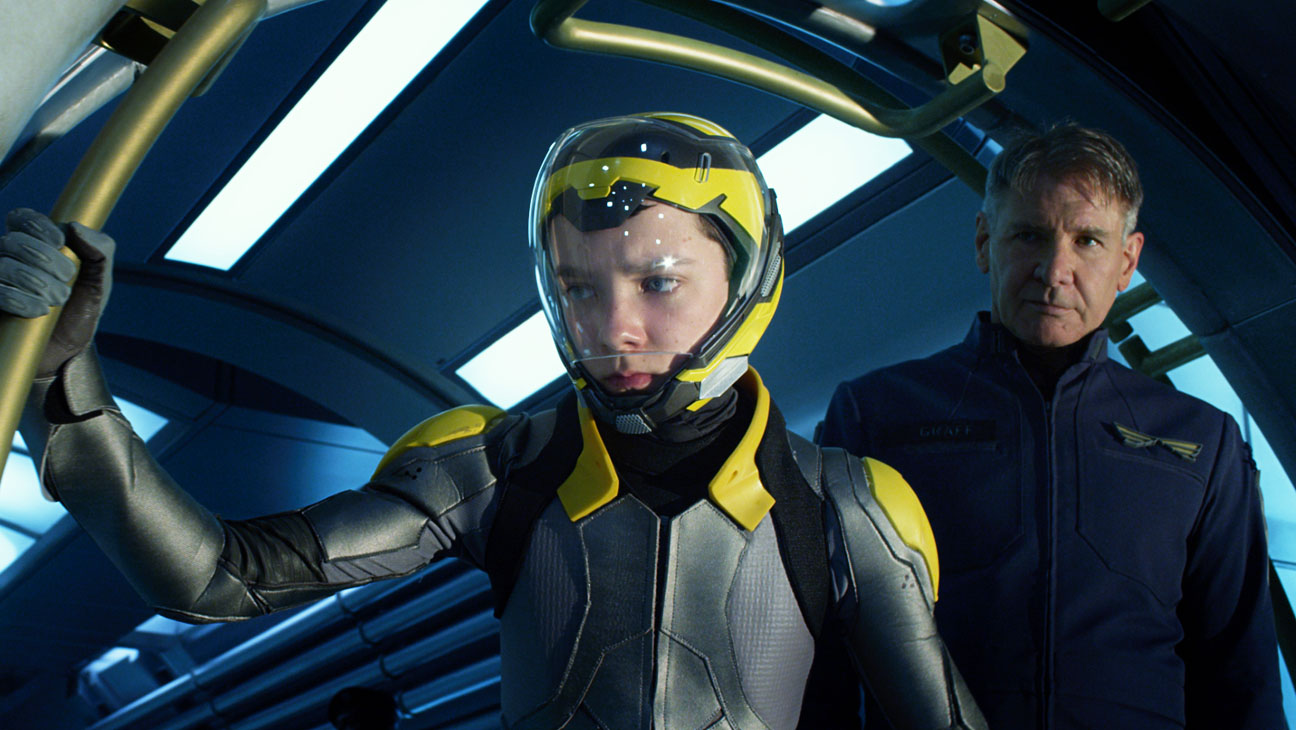
If you haven’t read this book, stop reading this and go read it. Then watch the movie again. Then read this again. Movies spoilers are one thing, but this is a classic of science fiction…the book, not the movie.
In Ender’s Game, Andrew Wiggin, played by Asa Butterfield, is nicknamed Ender because he’s a specially ordered third child when two children are the maximum allowed by law. He is a rare genius, and that’s just what the United Federation wants to prosecute a war against the Bugs. They are in a hurry, because they fear that the next Bugger assault is coming soon, and the whole world has joined into a single polity to face them.
Colonel Graff, played by Harrison Ford, is bound and determined to get Ender ready before the Bugs attack again, and works hard to train him in ways that seem weird, especially when he graduates from Battle School and begins his final training with the war hero from the last war, Mazer Rackham. He plays endless war simulations with many of his comrades from Battle School, each one getting progressively more difficult as time goes on. The final test is an attack on the Bugs homeworld, and Ender’s small team is hopelessly outnumbered and outgunned, but he wins anyway—he has finally become the genius they were hoping for, and finds a way to win, no matter what.
And then comes the twist: there was no game, each simulation included real ships, real crews, fighting the Bugs under his command, and he has not only won the battles, he has exterminated the entire Bugger race.
It makes sense that another book in the series is called Xenocide.
Why is the plot twist crazy?
How would you like to discover that you’d been tricked into killing off an entire race of aliens? Ender was not responsible, of course; the adults that deceived him bear the real responsibility. But still, imagine playing a video game and discovering that you had instead killed every single person in a small nation, say Ecuador. How would you feel? It might actually make one crazy, as it nearly does Ender.
7. The Village
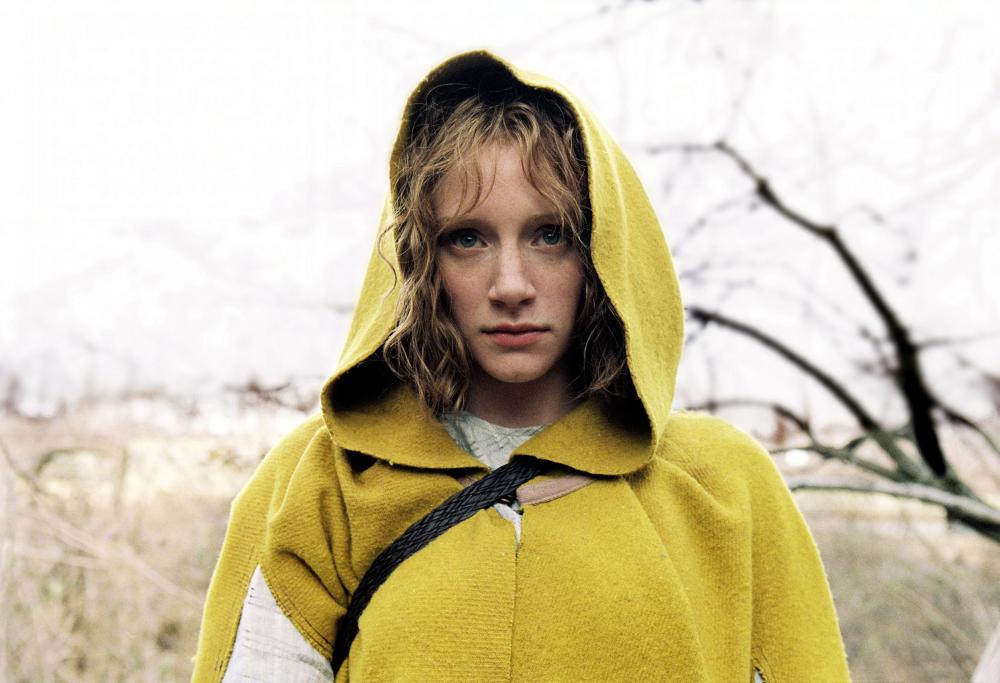
To anyone who knows much about the late 19th century, this movie might seem strange. The opening scene has these dates on a tombstone: 1890-1897. So of course one immediately thinks that the movie is taking place in the late Victorian period.
The same scene, however, doesn’t fit that time period. We have the father of the little boy who died leaning on the coffin before it is buried, talking in both language and sentiment that don’t fit that time at all. As the movie progresses, the people of the village seem to be an odd mix of modern and Victorian, such as when Sigourney Weaver says “I am but scared…”
The lack of religion makes it seem even stranger, making a religious commune from the late 19th century also unlikely. There were atheists, of course, in that time period, but they tended not to hew to the careful good manners and expressions of the small-town religious types.
Then there is the Great Fear: ‘those we don’t speak of.’ Some kind of monsters live in the forest all around the village, and everybody is terrified of them, except for one person, played by Joachin Phoenix, who is just plain fearless. He isn’t scared of ‘those we don’t speak of’ though he doesn’t exactly go out to fight them either; that’s not part of the ethics of the village. There is no warrior cult or tradition; they are all supposed to be scared, all the time.
And thus we have a unique creation in movies: a depiction of a working communism.
Everything is done communally, working, eating, etc. The village is run by a council, and they talk about ‘the towns’ far away with fear and loathing. They preach of the good color, yellow (i.e. fear), and the bad color, red (i.e. courage). And there is good reason for that—for a communism to work, fear is an essential ingredient. The leaders actually wear scary costumes to give their lies flesh, and fear keeps everybody in line, until three characters emerge that don’t fit the party line.
Lucius, played Joachin Phoenix, is courage, Noah, played by Adrien Brody, is envy, and Ivy, played by Bryce Dallas Howard, is blind love. Her character is actually blind. She and Lucius become engaged, and Noah envies them, and stabs Lucius multiple times. Lucius had requested to go to ‘the towns’ to get medicines that they don’t have in the village, and now, as he lies dying, Ivy goes instead.
Her protectors desert her, and Noah steals a costume and attacks her, but she manages to kill him instead. Then comes the twist. She finds a wall, climbs over it, and behold! She’s in the modern world. She gets the medicines in question from a sympathetic security guard, and we discover that the village lies at the heart of a nature preserve, and the reason for seclusion is because all of the town elders were victims of crime, and ran away from it in fear. But crime follows them anyway, because even in a perfectly designed communist society, where everybody shares equally, there will still be some things that will cause envy and strife.
Why is the twist crazy?
The wealth of Edward Walker, played by William Hurt, allowed him to create his little paradise in the middle of the woods, but even though he picked the right time period to build his society of good manners, he had no reason to abandon modern medicine. There’s no reason he couldn’t have prepared for the inevitable. At the beginning of the movie the 7-year-old son of one of the party elders has died due to a lack of modern medicine. Why trade one tragedy for another? Abandoning antibiotics didn’t have to happen.
For such a well-laid plan, it couldn’t really work, even though Ivy, because she was blind, couldn’t see the paved road and the Land Rover driving along it. Eventually reasons for inequality will always arise, but it still remains the only peek we’ve ever seen of an actual working communist village.
6. Predestination
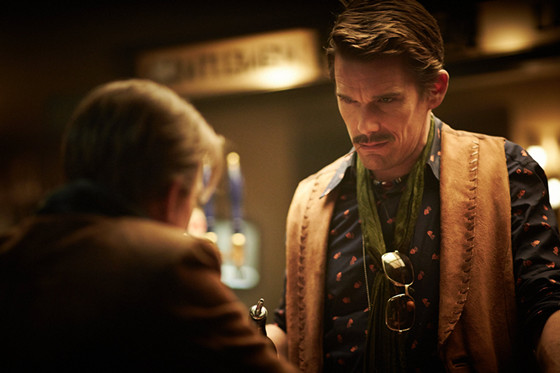
This is the weirdest of them all. If there was ever a stranger storyline, it probably vanished with advent of the Hayes Code. The paradoxical nature of time travel is fully explored in perhaps the most complete way ever.
Predestination follows a temporal agent who travels through time with a ‘coordinate transformer field kit’ disguised as a violin case. He is chasing the ‘Fizzle Bomber’ who is apparently traveling through time causing mayhem for reasons unknown. The Temporal Bureau, for whom the agent works, has been unable to apprehend the Fizzle Bomber for quite a while.
The agent was terribly injured by one of the bombs that he managed to defuse, and when healed he goes back undercover as a bartender where he chats with a particular customer, a man called John who writes for a magazine under the byline ‘Unmarried Mother.’ The man bets the agent that he can shock him with the story of his life, and goes into the story immediately.
John was born a girl, called Jane, and grew up as a girl. She had organs for both sexes, however, and after giving birth to a child out of wedlock (hence, ‘Unmarried Mother’) she became a he, and became capable of fathering children. After the story the agent takes John on a trip through time, giving him instructions on how things work, and then the story becomes ever more strange, and the twisty twists start rolling out.
John meets Jane, and essentially falls in love with herself/himself. What’s more, he’s the father of the child Jane has…who was abandoned at an orphanage in the past…so s/he is his/her own father and mother.
Then to cap it off, John is also the Fizzle Bomber, and looks completely different because of the damage caused by the bomb.
So John shoots his future self the Fizzle Bomber, and thus the paradoxical time loop begins again.
Why is this plot twist crazy?
It just is.